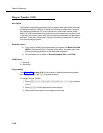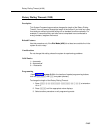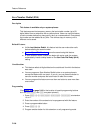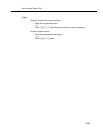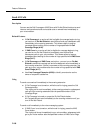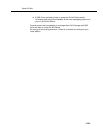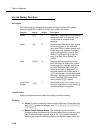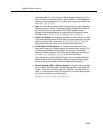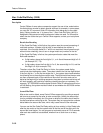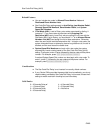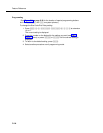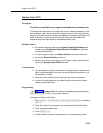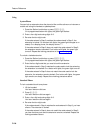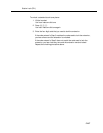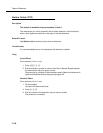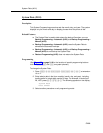
Feature Reference
5-192
Star Code Dial Delay (#410)
Description
Central Offices of some phone companies support the use of star codes before
the dialed phone number to obtain special services; for example, in some areas,
you can dial *67 to prevent Caller ID information from being sent to the called
party. (Rotary phones use 11 in place of the *.) Star Code Dial Delay (#410) is
designed to help prevent misdialing when star codes are used. For information
about the star codes that your Central Office supports, contact your local phone
company.
Restriction Resetting
If Star Code Dial Delay is Not Active, the system uses the normal processing of
restricted numbers: it checks, digit by digit, to see whether the number is
restricted. If the first digit dialed is a * and is not restricted, the call goes through
without further checking, since it can no longer match any number on the list.
If Star Code Dial Delay is Active, the system permits star codes that meet the
Bellcore® standard:
■ 2-digit codes, where the first digit is 0, 1, or 4–9 and the second digit is 0–9
(for example *67, *70).
■ 3-digit codes, where the first digit is 2 or 3, the second digit is 0–9, and the
third digit is 0–9 (for example *210).
Therefore, when Star Code Dial Delay is Active, the system resets dialing
restrictions after leading star codes. The system checks the first two digits dialed.
If the first digit is a * or the first two digits are 11, the system then checks whether
the following two or three digits are a star code. The digits that follow the star code
are then compared again to the restrictions. More than one star code can be
dialed at the beginning of a dialing sequence; the system’s number restrictions will
still work properly, with restriction-checking resetting as often as necessary. For
example, *67*705552539 could be dialed to block Caller ID information and to turn
off Call Waiting; the system would still check to see whether the 555-2539 number
is restricted.
Second Dial Tone
After a star code is dialed, some Central Offices respond by providing a second
dial tone as a prompt for the caller to enter more digits. Usually the second dial
tone is provided immediately, but if the tone is delayed, the caller should wait for
the dial tone before continuing to dial. The system may not recognize the numbers
dialed before the second dial tone, which may cause the call to be misrouted.
You can use the Star Code Dial Delay setting to force a delay in Auto Dialed calls
after the star code, so that the system waits to dial the rest of the digits until the
second dial tone begins. You can program an automatic pause of 0 to 5 seconds
after each star code that is autodialed, whether from a touch-tone or a rotary
phone.



